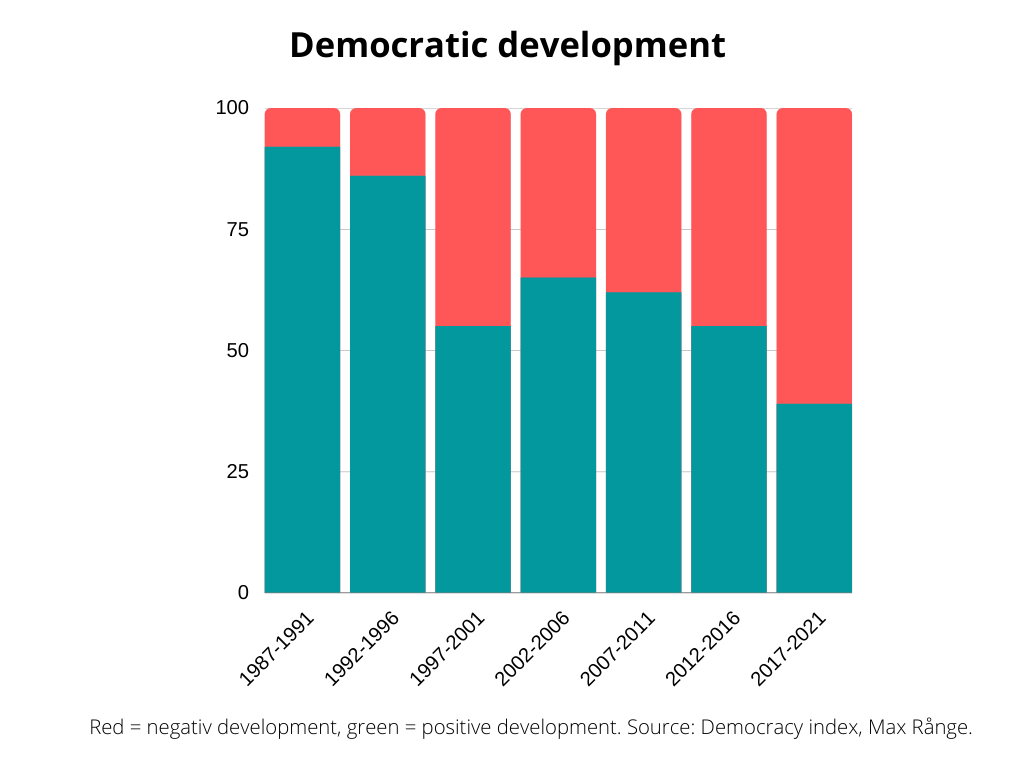
If one tries to digest all the negative arguments floundering around about the crisis of democracy, it's easy to get an impression of the world being more democratic a few decades ago. This is also in fact a false impression.
Going back to the early 2000s, Saddam Hussein remained in power in Iraq, Gaddafi in Libya, and Pakistan, for example, was authoritarian. At the same time, recent years have been more bad than good for democracy, the year 2021 in particular.
In 1986, three years before the fall of the Berlin Wall, 124 countries or autonomous territories were authoritarian. Today, 51 countries are considered authoritarian. This means there has been a reduction of 59 percent. Only three of these states were not authoritarian in 1986; Sudan, Venezuela, and Nicaragua.

It might be interesting and valuable to overview democratization since the 1980s by dividing it into seven equal periods of five years.
Between 1987 and 1991, for example, 52 countries underwent a change in the democratic level. 48 of these changes were in the positive direction and four in the negative. 92 percent thus changed in a positive, more democratic direction and eight percent in a hostile, less democratic direction. The years that followed look like this:
- 1992-1996: 86 percent positive direction, 14 percent negative.
- 1997-2001: 55 percent positive, 45 percent negative.
- 2002-2006: 65 percent positive, 35 percent negative.
- 2007-2011: 62 percent positive, 38 percent negative.
- 2012-2016: 55 percent positive, 45 percent negative.
- 2017-2021: 39 percent positive, 61 percent negative.
Thus, only in the very last five-year period has there been a more negative development, mainly due to 2021 being a terrible year for world democracy.

Some countries that took a step back regarding democracy during 2021 have done so by implementing a state of emergency or dissolving their parliaments. By pushing for democratic return, there ought to be good conditions for these countries to be re-democratized in the coming years. Comparisons with similar cases historically also strengthen this idea.
It is deplorable to see how the number of coups in the world has increased in recent years – but they are still not as frequent as in the 70s and 80s.
Even in the 1990s that followed the fall of the Berlin Wall, coups were common, mainly in Africa, but were followed by constitutional rule in most cases. Several countries in Africa that experienced turbulent years in the 1990s are today strong democracies, such as Liberia and Sierra Leone.
When we talk about Mali, Sudan, Guinea, and Burkina Faso today and rightly condemn the implementation of coups there, we must also remember that Mali, Guinea-Bissau, Mauritania, Niger, Côte d'Ivoire, and the Central African Republic have previously experienced coups that after reforms turned into constitutional, and many times, democratic rule.
In this respect, we can at least hope that countries in Africa, which have seen a democratic decline following coups, will be able to correct their course in the right direction within a couple of years and regain constitutional rule.
Admittedly, in the formal sense, Russia has been authoritarian since 2003. Although the "deteriorations" have not been as significant as is often suggested, there is currently no improvement to be expected either. Russia's formal opposition is mainly ineffective. Severe restrictions and deteriorations in political rights lead to solid repression against the informal opposition, where things are moving in the wrong direction. More overall, however, Russia has long been authoritarian.
Russia, which is devastatingly trying to destroy Ukraine's freedom and democracy, is now taking the form of an authoritarian superpower. With China's increased influence, this poses a severe threat to the development of democracy in general. Also as their influence can make Western democracy aid more ineffective. As China and Russia reward stability and predictability, support for authoritarian leaders may prevent local opposition from advancing.
Finally, it may be appropriate to highlight several countries that today, in 2022, are significantly more accessible than in the early 2000s. In addition to previously noted Pakistan above, Iraq, Libya, Algeria, the Maldives, Madagascar, Nigeria, Zimbabwe, Gambia, Malawi, Senegal, Angola, and the Ivory Coast – all of these are today classified as freer countries.
We should not ignore democratic setbacks; yet on the contrary, it is easy to forget the democratic successes obscured by the dark headlines.
Max Rånge
Democracy researcher at Halmstad University and creator of the democracy index MaxRange
Read more on the democracy subject:







